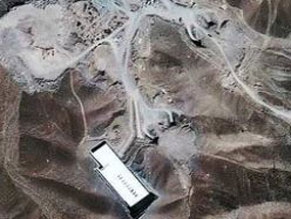|
World Jewish News

Satellite image of Iranian nuclear plant in Qom (photo by AP)
|
Israel shows China evidence of Iran bomb program
01.03.2010, Israel and the World An Israeli delegation that traveled to Beijing last week presented detailed intelligence on Iran's nuclear program in an attempt to persuade China that Tehran seeks atomic weapons, a senior diplomatic source told Haaretz.
The group, led by Strategic Affairs Minister Moshe Ya'alon and central bank chief Stanley Fischer, tried to persuade China to support sanctions on Iran by offering "the full intelligence picture available to Israel," the diplomat said.
The Israeli officials also told the Chinese that a nuclear Iran would push up oil prices - China depends on Iran for a significant proportion of its imported oil.
Israel is trying to recruit China's support for a fourth round of sanctions on Iran, and the UN Security Council is due to vote on the issue in the coming months. At the very least, Israel wants to ensure that China does not oppose the sanctions when they come to vote.
Israel also wants to make sure that China supports the report on Iran published by the new head of the International Atomic Energy Agency, Yukiya Amano. Unlike his predecessor Mohamed ElBaradei, Amano discussed in his report the possibility that Iran might secretively be developing nuclear weapons. The IAEA's annual conference is set to open in Vienna today.
The diplomat told Haaretz that the delegation's main aim was to present the Chinese with evidence that Iran is developing nuclear arms. China's official position is that Iran has a right to develop nuclear technology for peaceful, civilian purposes and that there is no proof Iran has a military nuclear program.
Most detailed overview in years
"The Chinese were given the full intelligence picture Israel has about the Iranian nuclear program, which clearly shows Iran is developing nuclear weapons," the source said.
"The delegation also stressed how concerned Israel was, and that all options must remain on the table," the source added.
The delegation that set out for Beijing in coordination with the U.S. administration also included senior officials in the Foreign Ministry, the National Security Council and the defense establishment.
It met with a number of Chinese officials, the most senior being State Councilor Dai Bingguo.
According to the source, the Israelis spent two hours presenting the Chinese with an overview of the intelligence information Israel has on Iran's nuclear program. This was the most detailed overview given by Israel to China in more than three years, since prime minister Ehud Olmert's visit in January 2007.
The Israeli delegation left with a positive feeling, the source said, with the Chinese saying they would seriously consider the information they received.
Talks were conducted in a friendly atmosphere, with Beijing stressing the importance of Chinese-Israeli relations and its desire to develop ties further, the source said.
Fischer detailed the implications a nuclear Iran would have for the world economy, stressing a dramatic rise in oil prices. Alternatives to importing oil from Iran were also discussed.
Earlier this year, Saudi Arabia and the United States proposed to China that it buy oil from Arab states at much lower prices than oil imported from Iran.
China is also concerned about possible sanctions because of its deals with Iran on developing railroads, tunnels and oil fields. These contracts are expected to be highly profitable, so the Chinese fear that sanctions would put them at risk.
Haaretz.com
|
|
